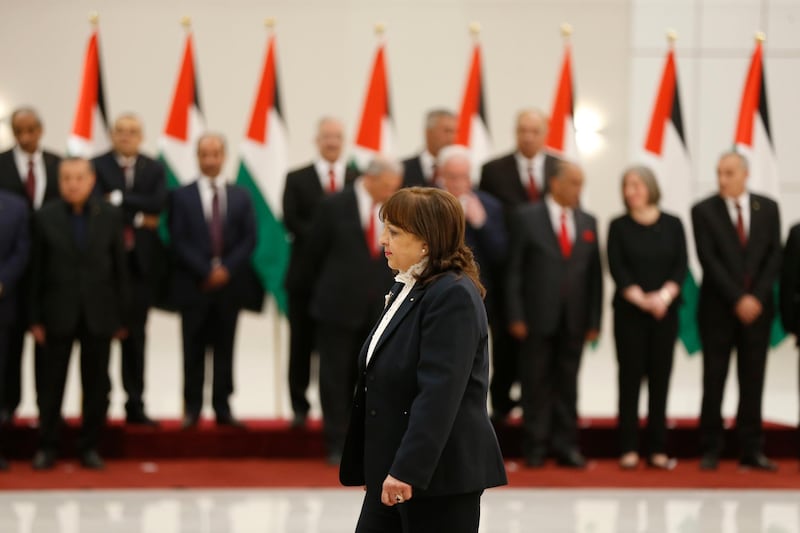A new Palestinian government, headed by Fatah’s Central Committee member Mohammad Shtayyeh, was sworn in before President Mahmoud Abbas on Saturday evening.
The newly formed government consists of Fatah members, technocrats and representatives of left-wing Palestine Liberation Organisation (PLO) factions.
Fatah initially hoped to form a government solely of PLO factions, thus excluding Hamas, the militant group that controls Gaza. However, the Popular Front for the Liberation of Palestine and the Democratic Front – both major PLO factions – refused to take part in Mr Shtayyeh's government, calling for a unity government that includes all Palestinian factions including Hamas.
Hamas has governed the Gaza Strip since 2007 when it ousted Fatah's security forces in a near civil war. Multiple reconciliation attempts have since failed.
The Shtayyeh government replaces the national consensus government headed by Rami Hamdallah. This non-factional technocratic unity government was formed in 2014 in an agreement between Fatah, Hamas and other Palestinian factions.
Mr Hamdallah’s government failed however to end the division between Hamas and Fatah as both sides blamed each other for the failure of reconciliation.
In April 2017, Mr Abbas imposed punitive measures on the Gaza Strip in an attempt to pressure Hamas to allow the consensus government to assume control of the coastal enclave, but failed to bring Hamas into line.
Fatah leaders say that there's no point keeping Mr Hamdallah's consensus government after its purpose was defeated.
"The consensus government was formed in agreement with Hamas for the purpose of uniting Gaza and the West Bank under a single technocratic government," senior Fatah official Majid Fityani told The National. "As Hamas five years later continues to refuse to allow the government to function in Gaza, the continuation of it is becoming pointless as the reason that it was formed for couldn't be achieved due to Hamas' intransigence."
Mr Fatyani said that the mounting challenges that the Palestinians face from the administration of US President Donald Trump and Israel constitutes "an urgent and critical need for a political government that are better able to stand up to these challenges."
He added: “The new government led by Dr Shtayyeh will also be better equipped to implement the PLO’s Central Council decisions to gradually disengage from Israel politically and economically and in other aspects.”
Palestinian factions that declined to take part in Mr Shtayyeh's government said that the challenges that the Palestinians face requires a unity government that includes all factions including Hamas.
"The challenges that the Palestinians face now requires that we adhere to ending the division and unite in the face of the political and economic crises we face," PFLP politburo member Jamal Mizher told The National. "We believe the new government will disrupt the reconciliation efforts and will deepen the division."
“We need to be able to guard the Palestinian cause from Trump’s deal of the century and from risk of permanent separation between Gaza and the West Bank, and we can do it when we’re all united.”
The new Palestinian government has been appointed days before Mr Trump is expected to release his widely anticipated Middle East peace plan.
Mr Abbas told the new government's that one of their main challenges ahead will be standing up to Mr Trump's peace plan.
“Before your government stands many difficult and complicated issues starting with Trump’s deal of the century," the Palestinian leader said.
The Palestinians would reject the plan regardless of its content, he said, “because it excluded Jerusalem from Palestine and therefore we’ve decided that we don’t want to see the rest.”
The Palestinians hope for the capital of their future state to be East Jerusalem.
Referring to the plan, Mr Abbas added: “More developments are going to happen in the coming days; thus, we need to cooperate to be able to face them because they’ll be difficult and dangerous.”
Hamas released a statement after the government was sworn in calling the new government a “separatist government that has no national legitimacy,” and said that it will reinforce the separation between the West Bank and Gaza.
Some critics say that the newly formed government came under the recommendation of Fatah’s Central Council to consolidate power in Fatah’s hands in a post-Abbas era.
Last year, the PLO’s Central Council took decisions to limit relations with Israel, disengage from Israel economically, stop security coordination with Israel, and reconsider agreements signed with Israel.
Fatah says that the new government will be the executive tool to implementing those hard decisions.
In his speech on Saturday, Mr Shtayyeh vowed that his government would protect welfare payments for families of Palestinians killed or imprisoned by Israel, despite growing pressure from the US and Israel.
Mr Shtayyeh faces a major challenge of how to alleviate the Palestinian Authority's (PA) financial woes caused after the US cut all aid to the Palestinian authority, and later exacerbated after Israel cut in February Palestinian tax clearance revenues which Israel collects on behalf of the PA.
In the past two months Israel withheld $11 million (Dh40.4 m) a month from Palestinian tax revenues. The money, Israel says, matches the amount the PA pays to families of Palestinian killed or imprisoned by Israel. In protest the PA declined to receive any tax revenues until the funds are restored.
Mr Shtayyeh is also expected to push for parliamentary elections. The last parliamentary elections were held in 2006.
The new government also came days after Israeli Prime Minister Benjamin Netanyahu won a fifth term in his country’s elections.






